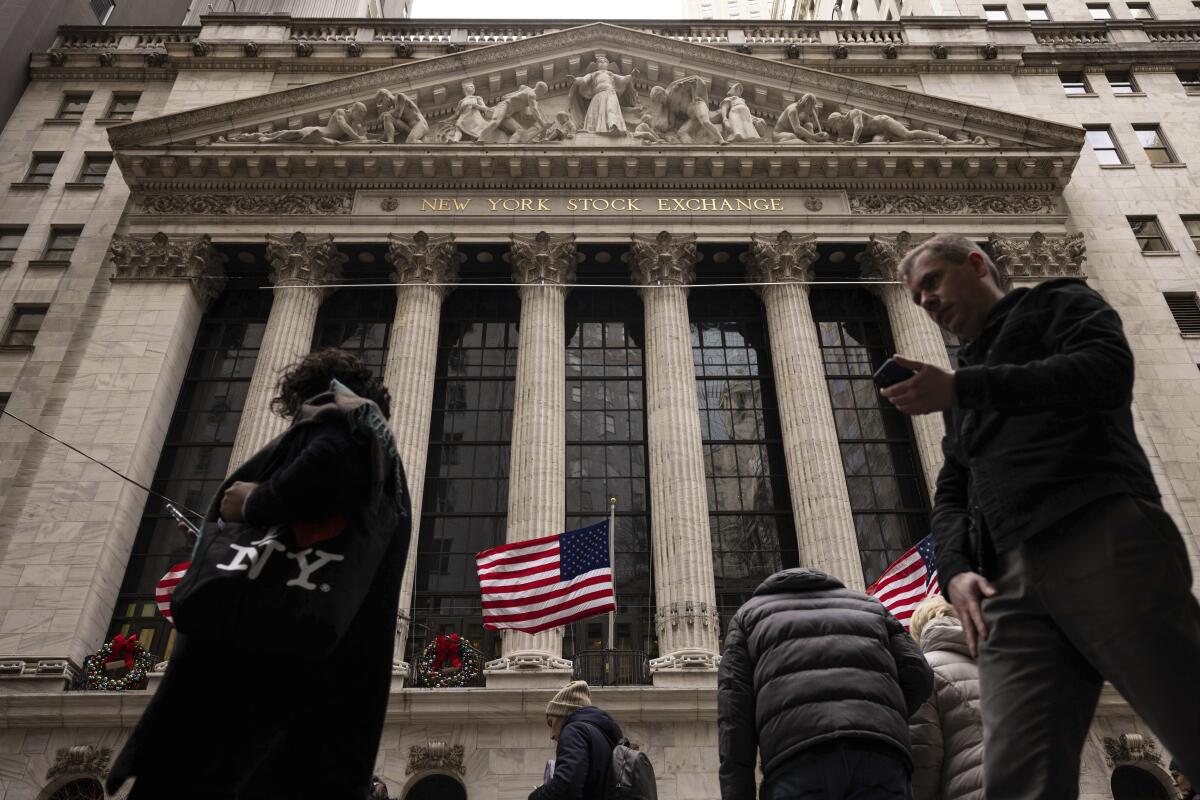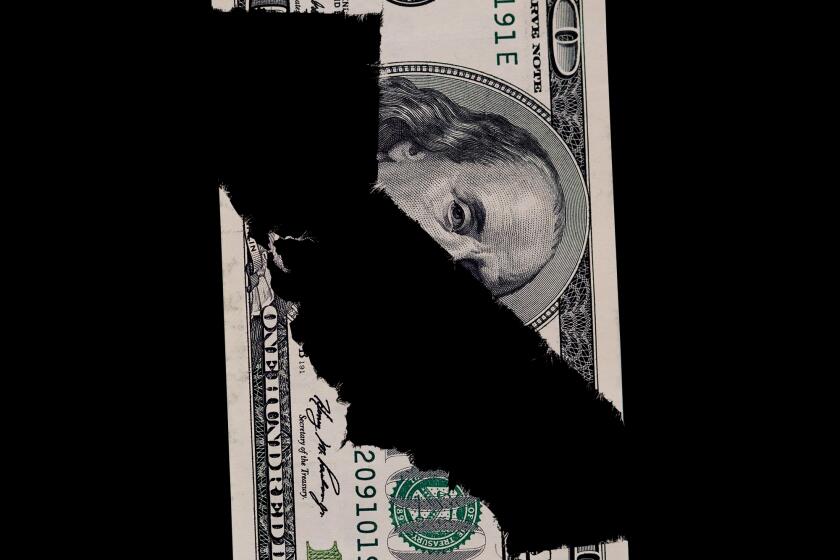Stocks dip on Wall Street as hopes dim for an imminent cut to interest rates

- Share via
Wall Street slipped Wednesday after another signal that it may have gotten too optimistic about when the Federal Reserve will deliver the cuts to interest rates that traders crave so much.
The Standard & Poor’s 500 fell 26.77 points, or 0.6%, to 4,739.21. It’s the second straight stumble for the index after it closed out its 10th winning week in the last 11 near its all-time high.
The Dow Jones industrial average dipped 94.45 points, or 0.3%, to 37,266.67, and the Nasdaq composite slumped 88.73 points, or 0.6%, to 14,855.62.
Rising yields in the bond market were once again putting downward pressure on stocks. Yields climbed after a report showed sales at U.S. retailers were stronger last month than economists expected. While that’s good news for an economy that has defied many predictions for a recession, it could also keep upward pressure on inflation.
That, in turn, could push the Federal Reserve to wait longer than traders expect to begin cutting interest rates after jacking them drastically higher over the last two years. Lower rates would relax the pressure on the economy and financial system, while also goosing prices for investments.
The yield on the 10-year Treasury jumped immediately after the retail sales report and climbed to 4.10% from 4.06% late Tuesday. Higher yields can crimp profits for companies, while also making investors less willing to pay high prices for stocks.
An uptick in nationwide inflation could have bigger consequences for Californians who are already paying higher prices for basic goods and services, including housing and energy.
Higher yields hurt all kinds of investments, and high-growth stocks tend to be some of the hardest hit. Drops of 2% for Tesla and 0.9% for Amazon were among the heaviest weights on the S&P 500. The smaller companies in the Russell 2000 index also slumped as much as 1.5% before paring their loss to 0.7%.
The Dow, meanwhile, has less of an emphasis on tech and high-growth companies. That helped limit its losses relative to the rest of the market.
The yield on the two-year Treasury, which more closely tracks expectations for the Fed, rose more strongly. It climbed to 4.34% from 4.22% late Tuesday as traders trimmed their expectations for the Fed’s first rate cut to arrive in March. Traders are now betting on a 60% probability of that, down from a shade more than 70% a month earlier, according to data from CME Group.
Treasury yields have already eased significantly since autumn on expectations for coming rate cuts, which in turn has sent stock prices near record heights. The 10-year yield was as high as 5% in October, and a delay in rate cuts would probably undercut the rally.
A top Fed official, Gov. Christopher Waller, said Tuesday that the central bank could take its time before its next move on rates given how resilient the economy has remained.
“These comments leave a rate cut as early as March on the table but also indicate that such a move is not a done deal,” according to economists at Deutsche Bank led by Amy Yang.
In a reversal from past decades, more college graduates and professionals are moving out of California than coming into it to escape the higher taxes and cost of living.
On Wednesday, across the Atlantic Ocean, the head of the European Central Bank warned in a speech about the risks of cutting rates too soon.
If Wall Street’s predictions for the timing of the rate cuts it desires so much do indeed prove wrong, it would be just the latest example of overzealousness by traders.
Interest rates are one of the main levers that set stock prices. The other is corporate profits, and several big companies reported weaker results on Wednesday than analysts expected.
U.S. Bancorp fell 1.4% after reporting weaker profit than analysts had forecast. Big 5 Sporting Goods fell 8% after saying it expects to report a worse loss for the last three months of 2023 than earlier expected because of weak sales of winter-related products. The company said it was hurt by warmer temperatures and a lack of snowfall in the West from October through December.
Charles Schwab reported stronger profit for the latest quarter than analysts expected, but its stock still fell 1.3%. Its revenue fell short of estimates, and analysts said its better-than-expected earnings were probably due in part to easier tax rates.
Spirit Airlines was under heavy pressure again and sank 22.5%. Its stock nearly halved on Tuesday, after a U.S. judge blocked its purchase by JetBlue Airways out of concern that the deal would lead to higher airfares. JetBlue lost 8.7%.
A federal judge sides with the Biden administration and blocks JetBlue from buying Spirit Airlines, saying the deal would reduce competition.
Wednesday’s slump for Wall Street followed a rough day for financial markets worldwide. Stock indexes fell roughly 1% in Europe after the comments by Christine Lagarde, the head of the European Central Bank.
They dropped even more sharply in Asia. Stocks sank 3.7% in Hong Kong and 2.1% in Shanghai as worries continue about a sluggish recovery for the world’s second-largest economy.
Japan’s Nikkei 225, which has been one of the new year’s biggest winners, slipped 0.4%.
AP writers Yuri Kageyama and Matt Ott contributed to this report.
More to Read
Inside the business of entertainment
The Wide Shot brings you news, analysis and insights on everything from streaming wars to production — and what it all means for the future.
You may occasionally receive promotional content from the Los Angeles Times.












